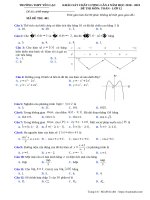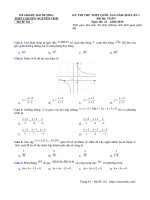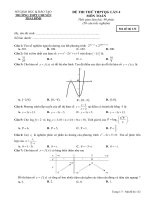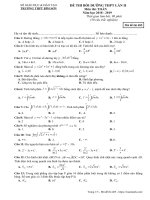Tải Ôn thi THPT Quốc gia năm 2019 môn Tiếng Anh số 36 - Đề thi thử THPTQG năm 2019 môn Tiếng Anh thầy Bùi Văn Vinh có đáp án
Bạn đang xem bản rút gọn của tài liệu. Xem và tải ngay bản đầy đủ của tài liệu tại đây (131.03 KB, 9 trang )
<span class='text_page_counter'>(1)</span><div class='page_container' data-page=1>
<b>ĐỀ LUYỆN THI THPT QUỐC GIA MÔN TIẾNG ANH</b>
<b>NĂM 2019 CÓ ĐÁP ÁN</b>
<i><b>* Mark the letter A, B,C or D on your answer sheet to indicate the word whose underlined</b></i>
<i><b>part differs from the other three in pronunciation in each of the following questions.</b></i>
<b>Question 1: A. identity B. obligatory</b> <b>C. interview</b> <b>D. insurance</b>
<b>Question 2: A. wished B. changed</b> <b>C. tipped</b> <b>D. produced</b>
<i><b>* Mark the letter A, B, C or D on your answer sheet to indicate the word whose, differs</b></i>
<i><b>from the other three in stress in each of the following questions.</b></i>
<b>Question 3: A. university B. application</b> <b>C. technology</b> <b>D. entertainment</b>
<b>Question 4: A. language B. design</b> <b>C. challenge</b> <b>D. courage</b>
<i><b>* Mark the letter A, B, C or D on your answer sheet to indicate the underlined part that</b></i>
<i><b>needs correction in each of the following questions.</b></i>
<b>Question 5: Economics have been developed rapidly since the last few years.</b>
<b> A</b> <b> B C D</b>
<b>Question 6: Higher education is very importance to national economies, and it is also a</b>
source source of
<b> A </b> <b> B</b>
trained and educated personnel for the whole country.
<b> C</b> <b> D</b>
<b>Question 7: Higher vocational education and training that combines teaching of both</b>
practical skills and theoretical expertise.
<b>A </b> <b> B</b> <b> </b>
<b> C D</b>
</div>
<span class='text_page_counter'>(2)</span><div class='page_container' data-page=2>
<b>Question 8: I made my ... to that company for a job a month ago but I haven’t</b>
received any reply yet.
<b>A. form</b> <b>B. application</b> <b>C. requirement</b> <b>D. letter</b>
<b>Question 9: Taking part in the Advanced Engineering Project gave me a chance to use</b>
my ... to help society.
<b>A. creativity</b> <b>B. creature</b> <b>C. create</b> <b>D. creative</b>
<b>Question 10: You can meet Mr. Pike, who is ... behalf ... the university to</b>
solve the problems of foreign students.
<b>A. on/ of</b> <b>B. in/ for</b> <b>C. with/ at</b> <b>D. for/ at</b>
<b>Question 11: He was the only ... that was offered the job.</b>
<b>A. apply</b> <b>B. application</b> <b>C. applying</b> <b>D. applicant</b>
<b>Question 12: Most ... are at senior level, requiring appropriate qualifications.</b>
<b>A. degrees</b> <b>B. grades</b> <b>C. colleges</b> <b>D. vacancies</b>
<b>Question 13: He had been expected to cope well with examinations and good results.</b>
<b>A. achieve</b> <b>B. last</b> <b>C. consider</b> <b>D. object</b>
<b>Question 14: She was the first in her family ... a college education.</b>
<b>A. get</b> <b>B. getting</b> <b>C. gotten</b> <b>D. to get</b>
<b>Question 15: A ... is an official document that you receive when you have</b>
completed a course of study or training.
<b>A. vocation</b> <b>B. certificate</b> <b>C. grade</b> <b>D. subject</b>
<b>Question 16: I would like to invite you to participate in the ... ceremony.</b>
<b>A. graduation</b> <b>B. graduate</b> <b>C. graduated</b> <b>D. graduating</b>
<b>Question 17: The A-level (short for Advanced Level) is a General Certificate of Education</b>
set of exams in the UK.
<b>A. indicated</b> <b>B. met</b> <b>C. spent</b> <b>D. taken</b>
<b>Question 18: It is very important for a film or a company to keep ... the changes in</b>
the market.
</div>
<span class='text_page_counter'>(3)</span><div class='page_container' data-page=3>
<b>Question 19: Students also have the opportunity to choose from a wide range of ...</b>
courses in the university.
<b>A. compulsory</b> <b>B. limited</b> <b>C. optional</b> <b>D. required</b>
<i><b>* Mark the letter A, B, C, or D on your answer sheet to indicate the most suitable response</b></i>
<i><b>to complete each of the following exchanges.</b></i>
<b>Question 20: - John: “I’ve passed my final exam.” - Tom: “ ... ”</b>
<b>A. Good luck.</b> <b>B. Congratulations!</b>
<b>C. That’s a good idea.</b> <b>D. It’s nice of you to say so.</b>
<b>Question 21: - Peter: “Thanks a lot for your wonderful gift.” - Mary: “ ... ”</b>
<b>A. You are welcome</b> <b>B. Thank you</b>
<b>C. Cheers</b> <b>D. Have a good day</b>
<i><b>* Mark the letter A, B, C, or D on your answer sheet to indicate the sentence that is</b></i>
<i><b>CLOSET in meaning to the underlined word(s) in each of the following questions.</b></i>
<b>Question 22: We are very anxious about the result of the exam.</b>
<b>A. careful</b> <b>B. excited</b> <b>C. careless</b> <b>D. worried</b>
<b>Question 23: The choice of a particular career is influenced by a number of factors.</b>
<b>A. usefulness</b> <b>B. success</b> <b>C. desire</b> <b>D. selection</b>
<i><b>* Mark the letter A, B, C, or D on your answer sheet to indicate the sentence that is</b></i>
<i><b>OPPOSITE</b></i>
<i><b>in meaning to the underlined word(s) in each of the following questions.</b></i>
<b>Question 24: We offer a speedy and secure service of transferring money in less than 24</b>
hours.
<b>A. uninterested</b> <b>B. open</b> <b>C. unsure</b> <b>D. slow</b>
<b>Question 25: A surprising percentage of the population in remote areas is illiterate.</b>
<b>A. able to speak fluently</b> <b>B. unable to speak fluently</b>
<b>C. unable to read and write</b> <b>D. able to read and write</b>
</div>
<span class='text_page_counter'>(4)</span><div class='page_container' data-page=4>
<b>Question 26: She said, “I’ll call the police if you don’t leave immediately!”</b>
<b>A. She frightened to call the police if he didn’t leave immediately.</b>
<b>B. She said to call the police if he didn’t leave immediately.</b>
<b>C. She scared to call the police if he didn’t leave immediately.</b>
<b>D. She threatened to call the police if he didn’t leave immediately.</b>
<b>Question 27: My sister said to me, “You are going to do the washing up, don’t forget.”</b>
<b>A. My sister told me to do the washing up.</b>
<b>B. My sister reminded me not to forget to do the washing up.</b>
<b>C. My sister reminded me to do the washing up.</b>
<b>D. My sister ordered me to do the washing up.</b>
<b>Question 28: The hag was heavy, so we could not take it with us.</b>
<b>A. If the bag were not heavy, we would take it with us.</b>
<b>B. Unless the bag had not been heavy, we would have taken it with us.</b>
<b>C. If had the bag not been heavy, we would have taken it with us.</b>
<b>D. Had the bag not been heavy, we would have taken it with us.</b>
<i><b>* Mark the letter A, B, C or D on your answer sheet to indicate the sentence that best</b></i>
<i><b>combines each pair of sentences in the following questions.</b></i>
<i><b>Question 29: Sue lives in a house. The house is opposite my house.</b></i>
<b>A. Sue lives in a house where is opposite my house.</b>
<b>B. Sue lives in a house which is opposite my house.</b>
<b>C. Sue lives in a house who is opposite my house.</b>
<b>D. Sue lives in a house and which is opposite my house.</b>
<i><b>Question 30: She turned the radio on at 7.30. She was still listening to it when her mother</b></i>
<i>came home at 9.00.</i>
<b>A. She has been listening to the radio at 7.30.</b>
<b>B. She had been listening to the radio since 7.30.</b>
</div>
<span class='text_page_counter'>(5)</span><div class='page_container' data-page=5>
<i><b>* Read the following passage and mark the letter A, B, C, or D on your answer sheet to</b></i>
<i><b>indicate the correct word or phrase that best fits each of the numbered blanks from 31 to</b></i>
<i><b>35.</b></i>
Education is more important today than ever before. It helps people (31) ... the
skills they need for such everyday (32) ... as reading a newspaper or managing their
money. It also gives them the specialized training they may need to prepare for a job or
career. For example, a person must (33) ... certain educational requirements and
obtain a (34) ... or certificate before he can practice law or medicine. Many fields,
like computer operation or police work, require satisfactory completion of special training
courses.
Education also helps people adjust to change. This habit has become necessary because
social changes today take place with increasing speed and affect the lives of more and more
people. Education can help a person understand these changes and provide him
(35) ... the skills for adjusting to them.
<b>Question 31: A. require B. acquire </b> <b>C. get </b> <b>D. have</b>
<b>Question 32: A. works B. jobs </b> <b>C. actions </b> <b>D. activities</b>
<b>Question 33: A. meet </b> <b>B. provide </b> <b>C. make </b> <b>D. show</b>
<b>Question 34: A. license B. card </b> <b>C. diploma </b> <b>D. paper</b>
<b>Question 35: A. in </b> <b>B. for </b> <b>C. with </b> <b>D. to</b>
<i><b>* Read the following passage and mark the letter A, B, C, or D on your answer sheet to</b></i>
<i><b>indicate the correct answer to each of the questions from 36 to 42.</b></i>
Although most universities in the United States are on a semester system, which offers
classes in the fall and spring, some schools observe a quarter system comprised of fall,
winter, spring, and summer quarters. The academic year, September to June, is divided into
three quarters of eleven weeks each, beginning in September, January, and March; the
summer quarter, June to August, is composed of shorter sessions of varying length.
</div>
<span class='text_page_counter'>(6)</span><div class='page_container' data-page=6>
addition, although most students begin their programs in the fall quarter, they may enter at
the beginning of any other quarters. Finally, since the physical facilities are kept in operation
year round, the resources are used effectively to serve the greatest number of students. But
there are several disadvantages as well. Many faculties complain that eleven-week term is
<b>simply not enough for them to cover the material required by most college courses. Students</b>
also find it difficult to complete the assignments in such a short period of time.
In order to combine the advantages of the quarter system with those of the semester system
<b>some colleges and universities have instituted a three-term trimester system. In fourteen</b>
weeks, faculty and students have more time to cover material and finish course
requirements, but the additional term provides options for admission during the year and
accelerates the degree programs for those students who wish to graduate early.
<b>Question 36: Which of the following would be the best title for this passage?</b>
<b>A. The Semester System</b> <b>B. The Academic Year</b>
<b>C. Universities in the United States</b> <b>D. The Quarter System</b>
<b>Question 37: A semester system... </b>
<b>A. has two major sessions a year</b>
<b>B. isn’t very popular in the United States</b>
<b>C. gives students the opportunity to study year round</b>
<b>D. has eleven-week sessions</b>
<b>Question 38: How many terms are there in a quarter system?</b>
<b>A. Three regular terms and one summer term.</b>
<b>B. One regular term and four summer terms.</b>
<b>C. Two regular terms and two summer terms.</b>
<b>D. Four regular terms and one summer term.</b>
<b>Question 39: The word “customary” in paragraph 2 could best be replaced by...</b>
<b>A. agreeable</b> <b>B. limited</b> <b>C. traditional</b> <b>D. length</b>
<b>Question 40: The word “them” in paragraph 2 refers to...</b>
</div>
<span class='text_page_counter'>(7)</span><div class='page_container' data-page=7>
<b>Question 41: The word “instituted” in paragraph 3 is closest in meaning to...</b>
<b>A. recommended</b> <b>B. established</b> <b>C. attempted</b> <b>D. considered</b>
<i><b>Question 42: Which of the following characteristics does NOT apply to trimesters?</b></i>
<b>A. They provide more options for admission.</b>
<b>B. They allow students to graduate early.</b>
<b>C. They last eleven weeks.</b>
<b>D. They are long enough to cover the course materials.</b>
<i><b>* Read the following passage and mark the letter A, B, C, or D on your answer sheet to</b></i>
<i><b>indicate the correct answer to each of the questions from 43 to 50</b></i>
In the exploration of the linguistic life cycle, it is apparent that it is much more difficult to
learn a second language in adulthood than a first language in childhood. Most adults never
<b>completely master foreign language, especially in phonology - hence the ubiquitous foreign</b>
accent. Their development often "fossilizes" into permanent error patterns that no teaching
or correction can do. Of course, there are great individual differences, which depend on
effort, attitudes, amount of exposure, quality of teaching and plain talent, but there seems to
be a cap for the best adults in the best circumstances.
Many explanations have been advanced for children's superiority: they exploit Motherless
<b>(the simplified, repetitive conversation between parents and children), make errors </b>
oneself-consciously, are more motivated to communicate, like to conform, are not set in their ways,
and have no first language to interfere. But some of these accounts are unlikely, based on
what is known about how language acquisition works. Recent evidence is calling these
social and motivation explanations into doubt. Holding every other factor constant, a key
factor stands out: sheer age.
</div>
<span class='text_page_counter'>(8)</span><div class='page_container' data-page=8>
<b>and those who arrived between 17 and 39 did the worst of all, and showed huge variability</b>
unrelated to their age of arrival.
<b>Question 43: The passage is mainly about...</b>
<b>A. how adults are different from children in learning languages</b>
<b>B. how language acquisition works among children</b>
<b>C. how the age factor is related to language learning</b>
<b>D. how research into language rules was done</b>
<b>Question 44: It can be inferred from the passage that "phonology" is the study of</b>
the... of a language.
<b>A. grammar</b> <b>B. vocabulary</b> <b>C. sound system</b> <b>D. native speakers</b>
<i><b>Question 45: According to the first paragraph, what is TRUE about adults' learning another</b></i>
language?
<b>A. Many of them can really master it.</b>
<b>B. Their accent is similar to that of native speakers.</b>
<b>C. Their errors in language use are short-term.</b>
<b>D. Their learning is affected by many factors.</b>
<b>Question 46: The word "conversation" in the passage is closest in meaning to which of the</b>
following?
<b>A. argument</b> <b>B. talk</b> <b>C. lesson</b> <b>D. discussion</b>
<b>Question 47: According to the second paragraph, children learn languages better than adults</b>
because of the following reasons EXCEPT...
<b>A. They repeat after their parents</b>
<b>B. They have had no languages</b>
<b>C. They don't love talking</b>
<b>D. They don't have a fixed method</b>
<b>Question 48: Which of the following is TRUE about the research mentioned in the passage?</b>
</div>
<span class='text_page_counter'>(9)</span><div class='page_container' data-page=9>
<b>C. It was done by a group of people.</b>
<b>D. All items in the test were erroneous.</b>
<b>Question 49: What does the word "Those'' in the last paragraph refer to?</b>
<b>A. Korean and Chinese-born students</b>
<b>B. American-born students</b>
<b>C. different age groups</b>
<b>D. English sentences</b>
<b>Question 50: Which of the following is closest in meaning to the word "huge" in the</b>
passage?
<b>A. wide</b> <b>B. strong</b> <b>C. weak</b> <b>D. small</b>
<b>ĐÁP ÁN</b>
<b>1.A</b> <b>2.B</b> <b>3.C</b> <b>4.B</b> <b>5.B</b> <b>6.A</b> <b>7.B</b> <b>8.B</b> <b>9.A</b> <b>10.A</b>
<b>11.D</b> <b>12.D</b> <b>13.A</b> <b>14.D</b> <b>15.B</b> <b>16.A</b> <b>17.D</b> <b>18.D</b> <b>19.C</b> <b>20.B</b>
<b>21.A</b> <b>22.D</b> <b>23.D</b> <b>24.C</b> <b>25.D</b> <b>26.D</b> <b>27.C</b> <b>28.D</b> <b>29.B</b> <b>30.B</b>
<b>31.B</b> <b>32.D</b> <b>33.A</b> <b>34.C</b> <b>35.C</b> <b>36.D</b> <b>37.A</b> <b>38A</b> <b>39.C</b> <b>40.C</b>
<b>41.B</b> <b>42.C</b> <b>43.C</b> <b>44.C</b> <b>45.D</b> <b>46.B</b> <b>47.C</b> <b>48.C</b> <b>49.A</b> <b>50.A</b>
</div>
<!--links-->









